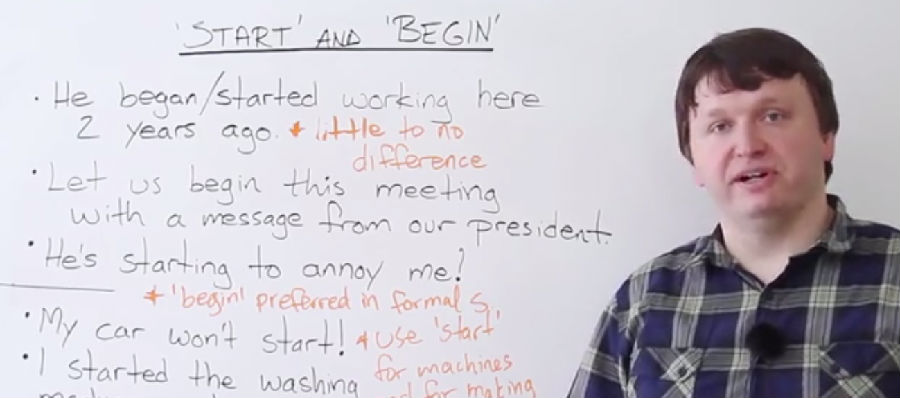Hi guys. I'm Alex. Thanks for clicking, and welcome to this lesson on "start" and "begin".
大家好,我是Alex,感谢点击收看,这节课我们讲"start"和"begin"。
These are two incredibly common words in the English language, and while most of the time there is no real difference between one or the other,
在大多数情况下这两个单词基本相同,没什么实质性的差别,
there are some situations where one or the other is preferred, or when there is a certain grammatical structure that is preferred after "start" or "begin".
但是在某些情况下会更倾向于某个单词,而且这两个单词后面的语法结构有各有不同。
So let's see what I'm talking about here.In the beginning, we have, "He began/started working here two years ago."
我们来具体看一下。第一句,"He began/started working here two years ago."
Which one of these should we use in this situation?Should we use "begin"? Should we "start"? Does it matter?It really doesn't, right?
这种情况下我们该用哪一个?应该用"begin"?或者"start"?有什么特别大的区别吗?并没有区别,对吧?
So for the most part -- I mean, you can say, "He began working here two years ago." "He started working here two years ago."
大多数情况下,"He began working here two years ago." "He started working here two years ago." 都可以说。
But usually, there is little to no difference in most situations.
通常都没有太大差别。
In most situations, you can use one or the other, so: "The concert started at nine." "The concert began at nine." Whatever you want to say, okay?
大多数情况下,两个都可以用,"The concert started at nine." "The concert began at nine.",想怎么说都行。

However, there is a level of -- or an issue with formality when it comes to "start" and "begin".
但是这两个单词的正式程度有差别。
When you are talking about a formal situation, "begin" is actually preferred.
当你在说一个比较正式的场景,多用"begin"。
So if you look at these two sentences: "Let us begin this meeting with a message from our president."
我们来看这两个句子,"Let us begin this meeting with a message from our president."
It is possible to say, "Let us start this meeting", but in formal situations, "begin" is the one that's actually preferred.
也可以说"Let us start this meeting",但是在正式场合下,"begin"的使用要多一些。
"He's starting to annoy me!" "He's beginning to annoy me." "Beginning to annoy me," sounds a little more formal.
"He's starting to annoy me!" "He's beginning to annoy me." "Beginning to annoy me," 这个听起来更正式。
Like, you're just a little more upset.So in informal situations, we use "start" more often than not.
听起来就像你更生气一点。但是在非正式场合下,"start"用的就多了。
Again, "begin" is preferred in formal situations.I'll just leave it as "S"; it means "situations".
再强调一遍,"Begin"正式场合用的更多。我这个地方写一个"S"代表"situations"。
Now, when we're talking about machines, or when we are talking about making something "start" or "begin", there's only one word that really works, and that word is "start".
但是说到机器的时候,或者当我们说到要启动某个东西的时候,只用一个单词能用,那就是"start"。
So you can't "begin" your car.You can't "begin" your washing machine.
你不能"begin"汽车。不能"begin"洗碗机。
When it comes to machines or making something start or begin, we can only use "start", okay?
当涉及到机器或者启动某个东西,我们只能用"start",记住了吗?
So, "My car won't start." We don't say, "My car won't begin."
所以是,"My car won't start."而不是"My car won't begin."
"I started the washing machine an hour ago." Not, "I began the washing machine an hour ago."
"I started the washing machine an hour ago."而不是"I began the washing machine an hour ago."
So again, we use "start" for machines and for making something start.And I'm just going to put "S/T" for something.
"Start"表示机器或者启动。我用"ST"在这里表示某物了。
Okay, so if you're the person who's making something start, you "start", not "begin".
所以你要让某个东西启动的话,你要用"start"而不是"begin"。
If a machine doesn't work, it means that it won't "start", not it won't "begin".
如果机器不运作了,那就是"start"不了了,而不是不能"begin"了。
So you can say, "My laptop won't start." "My lawnmower won't start." "My car won't start."Not "begin". Okay, guys?
所以你可以说,"My laptop won't start." "My lawnmower won't start." "My car won't start."不能用"begin",明白了吗?
Finally, let's look at a grammatical structure that is often followed after "start" or "begin".
最后我们来看看这两个单词后面跟的语法结构。
So as we mentioned, most situations -- little to no difference however, if you want to add -- let's look at this sentence.
就像我说的,大部分情况下没有差别,如果你想要急啊东西的话——来看看这个句子。
"He's starting improving", or "He's starting to improve":Which one of these sentences sounds better?
"He's starting improving"还是"He's starting to improve"?这两个句子哪个听起来更好?
"He is starting improving", or "He is starting to improve"?Well, if you said, "He's starting to improve", you're right.
"He is starting improving"还是"He is starting to improve"?如果你说"He is starting to improve",那就对了。
Basically, when you are using a continuous form, like "he is starting", "she is starting", when somebody is doing something,
一般情况来说,当你在用进行时,比如"he is starting", "she is starting"这种说某个人正在做某事的时候,
the infinitive form of the verb is preferred after "start" or "begin", okay?
"start"或"begin"后面要跟不定式,明白吗?
I'm running out of room here, guys, so let's go over here.
这边没地方了,我写在这里。
Infinitive is preferred after "start" or "begin" when used in continuous -- in the continuous form.
当进行时的时候,"start"或"begin"后面要跟不定式。
So, "It's starting to rain", not, "It is starting raining." "It is starting to rain." "It is beginning to rain." Not, "It is beginning raining."
"It's starting to rain",而不是It is starting raining." "It is starting to rain." "It is beginning to rain."而不是"It is beginning raining."
Okay. Finally, we "began to realize/understand/know", these three verbs in particular, to "realize", "understand", "know"
好了,最后,我们开始"realize/understand/know"(懂得)了,
if you use "realize", "understand" or "know" after "begin" or after "start", the infinitive form is also preferred.
这三个单词特别注意,如果在"begin"或者"start"后面跟这三个单词,也要用不定式。
So again, not "We began realizing", "We began understanding", "We began knowing" -- You can say it in informal speech.It is possible.
不能说"We began realizing", "We began understanding", "We began knowing"——非正式场合里面可以这么说。也是可能出现的。
However, the preference is to use the infinitive form, okay?
但是最好用不定式,明白吗?
So remember, use infinitives if you're using a continuous form of "start" or "begin", or if you're following it with "realize", "understand", or "know".
记住,进行时或者后面接"realize/understand/know"的时候,要用不定式。
Okay, guys, just as a quick review of the other lessons that we've learned here today -- most situations -- there's really no difference between "start" and "begin".
好了,快速复习一下,大多数情况下,这两个单词没有差别。
However, there is a level of formality that becomes an issue.
正式程度略有不同。
So if you are in a formal situation, "begin" is preferred -- informally, we use "start".
当在正式场合下,用"begin",不正式的时候用"start"。
When you're talking about machines, you use "start", not "begin".
说到机器的时候,用"start"不用"begin"。
When you're talking about "making something start", you also use "start" and not "begin".That's it.
启动某个东西的时候,用"start"不用"begin"。好了,就是这样。
Okay, guys, to test your understanding of the knowledge that you see on the board here, you can check out the quiz on www. engvid.com,
如果你想要检测一下自己,可以到www.engvid.com上做测验,
and don't forget to subscribe to my YouTube channel.Good luck, and take care.


